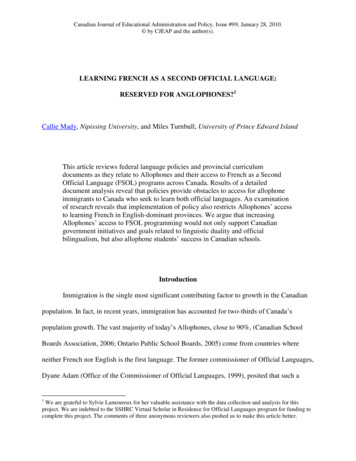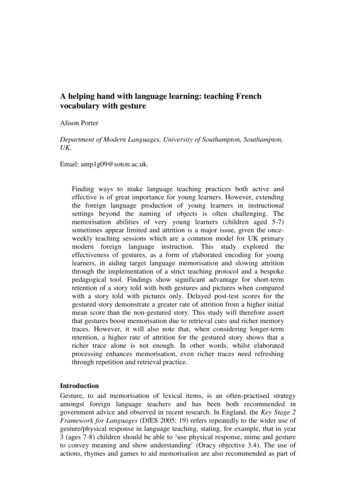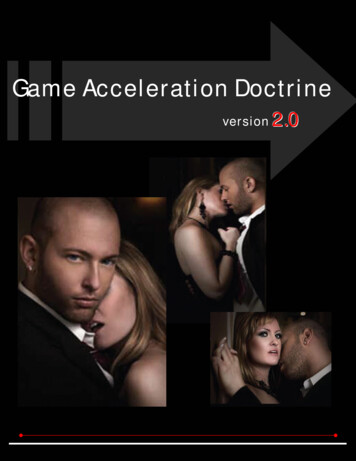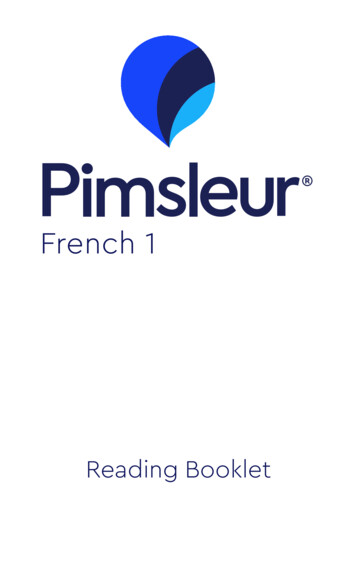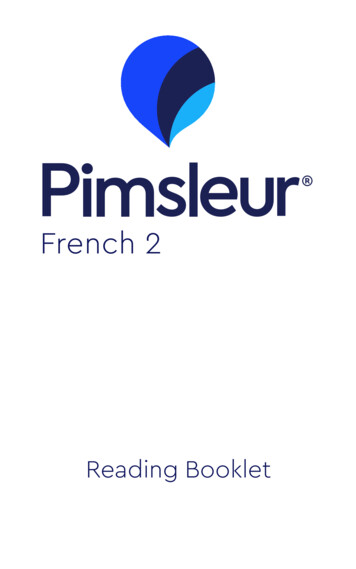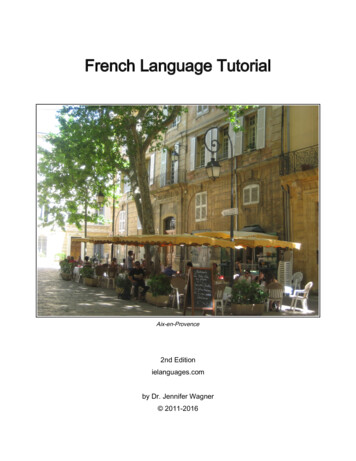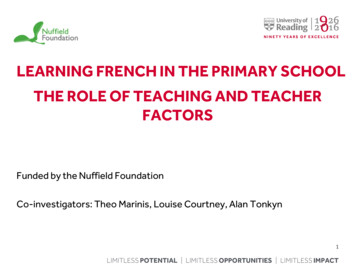
Transcription
LEARNING FRENCH IN THE PRIMARY SCHOOLTHE ROLE OF TEACHING AND TEACHERFACTORSFunded by the Nuffield FoundationCo-investigators: Theo Marinis, Louise Courtney, Alan Tonkyn1LIMITLESS POTENTIAL LIMITLESS OPPORTUNITIES LIMITLESS IMPACT
STUDY AIMS Within the context of learning French in England at primaryschool, to compare the impact of oracy and literacyapproaches on: Children’s knowledge of the underlying system of the foreignlanguage (gender, adjectival endings, simple present) Investigate the impact of other teaching and teacher-relatedfactors2LIMITLESS POTENTIAL LIMITLESS OPPORTUNITIES LIMITLESS IMPACT
PRIMARY LANGUAGES Relatively little research into outcomes of PML inEngland Amount and quality of input important (Myles &Mitchell, 2011; Muñoz, 2014) – more importantthan age in classroom contexts Little research evidence regarding relative benefitsof different teaching approaches, or of the impact ofdifferent teacher-related factors (proficiency,training, teaching time)3LIMITLESS POTENTIAL LIMITLESS OPPORTUNITIES LIMITLESS IMPACT
THE IMPORTANCE OF TEACHING To ensure we establish the best possibleenvironment for language learning in theprimary school, we need to establish what theimpact on outcomes is of variability acrossteaching and teacher factors Essential information if we are to supportteachers adequately4LIMITLESS POTENTIAL LIMITLESS OPPORTUNITIES LIMITLESS IMPACT
TEACHER FACTORS AND ATTAINMENT Edelenbos and Suhre (1994): teaching approaches (grammarvs. CLT), teaching experience and teaching qualifications,teacher spoken fluency, teaching time Teaching time positively related to all scores except learners’spoken fluency Teaching qualification the most important teacher factor forpredicting a wide range of outcomes Teacher spoken fluency positively related only to learners’grammar scores Only difference attributable to course on the grammar test learners following ‘grammar’ courses had the higher scores. Teachers who used grammar courses also the most qualifiedand experienced; also had more teaching time5LIMITLESS POTENTIAL LIMITLESS OPPORTUNITIES LIMITLESS IMPACT
TEACHER LANGUAGE PROFICIENCY Research, mainly in EFL/ESL contexts, indicates acomplex relationship between teacher factors andoutcomes Bowers and Vasilyeva (2011) - number of wordsspoken by native speaker teachers positively relatedto learners’ receptive vocabulary knowledge, butlength of teacher’s utterances negatively correlatedwith it.6LIMITLESS POTENTIAL LIMITLESS OPPORTUNITIES LIMITLESS IMPACT
TEACHER LANGUAGE PROFICIENCY Relatively uncomplicated input needed forbeginners, who can only take advantage of nativespeaker input once they are beyond the verybeginner stage? But native speaker input may sow the seeds for laterdevelopment? Aukrust (2007) - amount, diversity, and discoursecomplexity of teacher input only predicted preschoollearners’ language outcomes two years later7LIMITLESS POTENTIAL LIMITLESS OPPORTUNITIES LIMITLESS IMPACT
TEACHER LANGUAGE PROFICIENCYAND TEACHING TIME Unsworth, Persson, Prins and De Bot (2015) Impact of teacher language expertise and weeklylanguage lesson time on vocabulary and grammar for194 Dutch children learning English, 1st two years oflearning Teacher (oral) language proficiency- from nativespeaker to A1 Weekly English lesson time ranged from 40 (‘regular’English classes) to 220 minutes (‘early English’schools)8LIMITLESS POTENTIAL LIMITLESS OPPORTUNITIES LIMITLESS IMPACT
TEACHER LANGUAGE PROFICIENCYAND TEACHING TIME Both teaching time and teacher proficiency veryimportant factors in scores for grammar andvocabulary development, especially where childrenreceived under 60 minutes a week of Englishinstruction, and where the teachers’ proficiency levelwas below level B1. But teachers’ proficiency was the best predictor ofoutcomes9LIMITLESS POTENTIAL LIMITLESS OPPORTUNITIES LIMITLESS IMPACT
OUR OWN CONTEXT Issues of teaching time, teacherlanguage proficiency and training(Tinsley & Board, 2016)10LIMITLESS POTENTIAL LIMITLESS OPPORTUNITIES LIMITLESS IMPACT
TEACHING APPROACHES ‘Oracy’ and ‘literacy’ equally weighted in previous Key Stage2 Framework (2005) Current National Currlculum - increased emphasis onliteracy-based skills However: in practice oracy predominates Reading/writing skills less well-developed (Cable et al, 2010;Ofsted, 2011) Low use of verbs and high use of formulaic phrases Unclear whether this is directly attributable to a largely oralapproach11LIMITLESS POTENTIAL LIMITLESS OPPORTUNITIES LIMITLESS IMPACT
Research questions What is the impact of two different teachingapproaches on vocabulary and grammaticalknowledge (gender, adjectival agreement, simplepresent tense verbs) for learners of French inYears 5, 6 and 7? What is the relationship between teacher languageproficiency, training, teaching time at KS2 onvocabulary and grammatical knowledge?12LIMITLESS POTENTIAL LIMITLESS OPPORTUNITIES LIMITLESS IMPACT
Methodology Longitudinal, over two years (2012-2014)Tasks in Years 5, 6 and 7ParticipantsApprox. 250 children in total (9 schools)Oracy and literacy groups (3 schools each,removing borderline schools), based onteachers’ reported (questionnaire) andactual practice (observation)13LIMITLESS POTENTIAL LIMITLESS OPPORTUNITIES LIMITLESS IMPACT
Research design and participantsLanguage tasks 100Time 1 (SummerYear 5) - testsTime 2 (SpringYear 6)Tests quest.1645477Time 3 (AutumnYear 7) tests 14quest.LIMITLESS POTENTIAL LIMITLESS OPPORTUNITIES LIMITLESS IMPACT
TEACHING/TEACHER VARIABLESSchoolTeacher FrenchTraining inlanguage teachingMinutes perweekTeachingapproach1DegreePGCE specialism60Literacy2Native speakerPGCE specialism40Oracy3DegreePGCE me within generaltraining15Oracy6NoneNone30Borderline7Native speakerPGCE specialism60Oracy8DegreePGCE specialism40Borderline9DegreePGCE specialism30Literacy15LIMITLESS POTENTIAL LIMITLESS OPPORTUNITIES LIMITLESS IMPACT
Research methods – sentence repetition Listen to sentences and repeat them verbatim. Sentences are relatively long in order to tax the children’sprocessing ability enough so that they have to analyse thesentences they hear and reconstruct their meaning andgrammar instead of parroting. Children can repeat and correct the sentences they hearonly if they have acquired the grammatical features involved(Lust et al, 1996). Provides a window into the grammaticalsystem of the learner16LIMITLESS POTENTIAL LIMITLESS OPPORTUNITIES LIMITLESS IMPACT
Research methods – sentence repetition Three grammatical features 8 items per feature :– article-noun agreement (gender)– adjective-noun agreement (gender)– simple present tense verbs– Nouns and verbs taken from commonly used PL schemes ofwork, cross-checked with schools’ Schemes of Work17LIMITLESS POTENTIAL LIMITLESS OPPORTUNITIES LIMITLESS IMPACT
18LIMITLESS POTENTIAL LIMITLESS OPPORTUNITIES LIMITLESS IMPACT
Research methods – oral production(Photo description task, PD) Three grammatical features 6 items per feature :– article-noun agreement– adjective-noun agreement– simple present tense verbs19LIMITLESS POTENTIAL LIMITLESS OPPORTUNITIES LIMITLESS IMPACT
Photo description – part A Learners saw picture of a noun Were asked ‘Qu’est-ce que c’est?’ (What is it?)20LIMITLESS POTENTIAL LIMITLESS OPPORTUNITIES LIMITLESS IMPACT
University ofReading 2008LIMITLESS POTENTIAL LIMITLESSOPPORTUNITIES www.reading.ac.ukLIMITLESS IMPACT
Photo description – part B Learners saw picture of an ‘action’ Were asked ‘Qu’est-ce qu’il fait?’ (What’s hedoing?) Other important data: English literacy (reading andwriting) scores22LIMITLESS POTENTIAL LIMITLESS OPPORTUNITIES LIMITLESS IMPACT
LIMITLESS POTENTIAL LIMITLESS OPPORTUNITIES LIMITLESS IMPACT
Results: Small but statistically significant improvement acrossthe time points for SR and PD tasks Significant but modest correlations with teachervariables and teaching time, but not consistently so No impact of teaching approach24LIMITLESS POTENTIAL LIMITLESS OPPORTUNITIES LIMITLESS IMPACT
Results – effect of teaching approachsentence repetition task25LIMITLESS POTENTIAL LIMITLESS OPPORTUNITIES LIMITLESS IMPACT
TEACHING APPROACHES Little difference in mean scores for the two approaches at alltime points Analysis to explore role of teaching approaches whilecontrolling for learners’ English literacy scores and all teachervariables together (‘School’) At each time point, a very large amount of the varianceexplained by English literacy levels In spite of this, however, ‘School’ overall had a significantinfluence on outcomes, but Teaching Approach did not –except for lower English literacy learners on PD task26LIMITLESS POTENTIAL LIMITLESS OPPORTUNITIES LIMITLESS IMPACT
PHOTO DESCRIPTION SCORES FOR THE LOWLITERACY GROUP1412108LiteracyOracy6420Yr5Yr6Yr727LIMITLESS POTENTIAL LIMITLESS OPPORTUNITIES LIMITLESS IMPACT
RELATIONSHIPS: SR TASKOutcomeGlobal scoresVocabularyGrammarYearTeacher FrenchproficiencyTeacher trainingTeaching 92*.211**.211**28LIMITLESS POTENTIAL LIMITLESS OPPORTUNITIES LIMITLESS IMPACT
PHOTO DESCRIPTIONOutcomeGlobal scoresVocabularyGrammarYearTeacher FrenchproficiencyTeacher trainingTeaching 274**.288**29LIMITLESS POTENTIAL LIMITLESS OPPORTUNITIES LIMITLESS IMPACT
LANGUAGE TEST SCORES ANDWEEKLY TEACHING TIME4035302515 minutes30 minutes2040 minutes60 minutes151050Year 5Year 6Year 730LIMITLESS POTENTIAL LIMITLESS OPPORTUNITIES LIMITLESS IMPACT
WHAT DOES THIS SUGGEST? Importance of teaching time! 60 minutes groups always ahead – but gap narrowingin Year 7 Secondary schools not capitalising on their primaryschool progress? No significant difference between any of the groupsreceiving under 60 minutes a week at primary school 60 minutes a week seems to be an importantthreshold31LIMITLESS POTENTIAL LIMITLESS OPPORTUNITIES LIMITLESS IMPACT
TEACHER PROFICIENCY & LEARNER PROGRESSIN Year 5Year 6Year 720GCSEDegreeNative speaker32LIMITLESS POTENTIAL LIMITLESS OPPORTUNITIES LIMITLESS IMPACT
WHAT DOES THIS SUGGEST? Teacher language proficiency matters, especially forgrammatical development Its effect is complex Learners taught by native speaker teachers alwaysscored more highly but with uneven progress Seeds sown for later development? But learners taught by teacher with a degree madethe most steady progress Limited progress for other groups33LIMITLESS POTENTIAL LIMITLESS OPPORTUNITIES LIMITLESS IMPACT
CONCLUSIONS Variation at primary school in teaching time, teacherlanguage proficiency and teacher training leading towide variation in outcomes Perhaps unsurprising but generally underacknowledged Essential information if we are to support teachersadequately and equip them for the task in hand “trusting young age of learning with the burden oflearning success is clearly not enough” (Muñoz, 2011:130)34LIMITLESS POTENTIAL LIMITLESS OPPORTUNITIES LIMITLESS IMPACT
Thank you!s.j.graham@reading.ac.uk35LIMITLESS POTENTIAL LIMITLESS OPPORTUNITIES LIMITLESS IMPACT
LEARNING FRENCH IN THE PRIMARY SCHOOL THE ROLE OF TEACHING AND TEACHER FACTORS Funded by the Nuffield Foundation Co-investigators: Theo Marinis, Louise Courtney, Alan Tonkyn 1. LIMITLESS POTENTIAL LIMITLESS OPPORTUNITIES LIMITLESS IMPACT STUDY AIMS Within the context of learning French in England at primary school, to compare the impact of oracy
